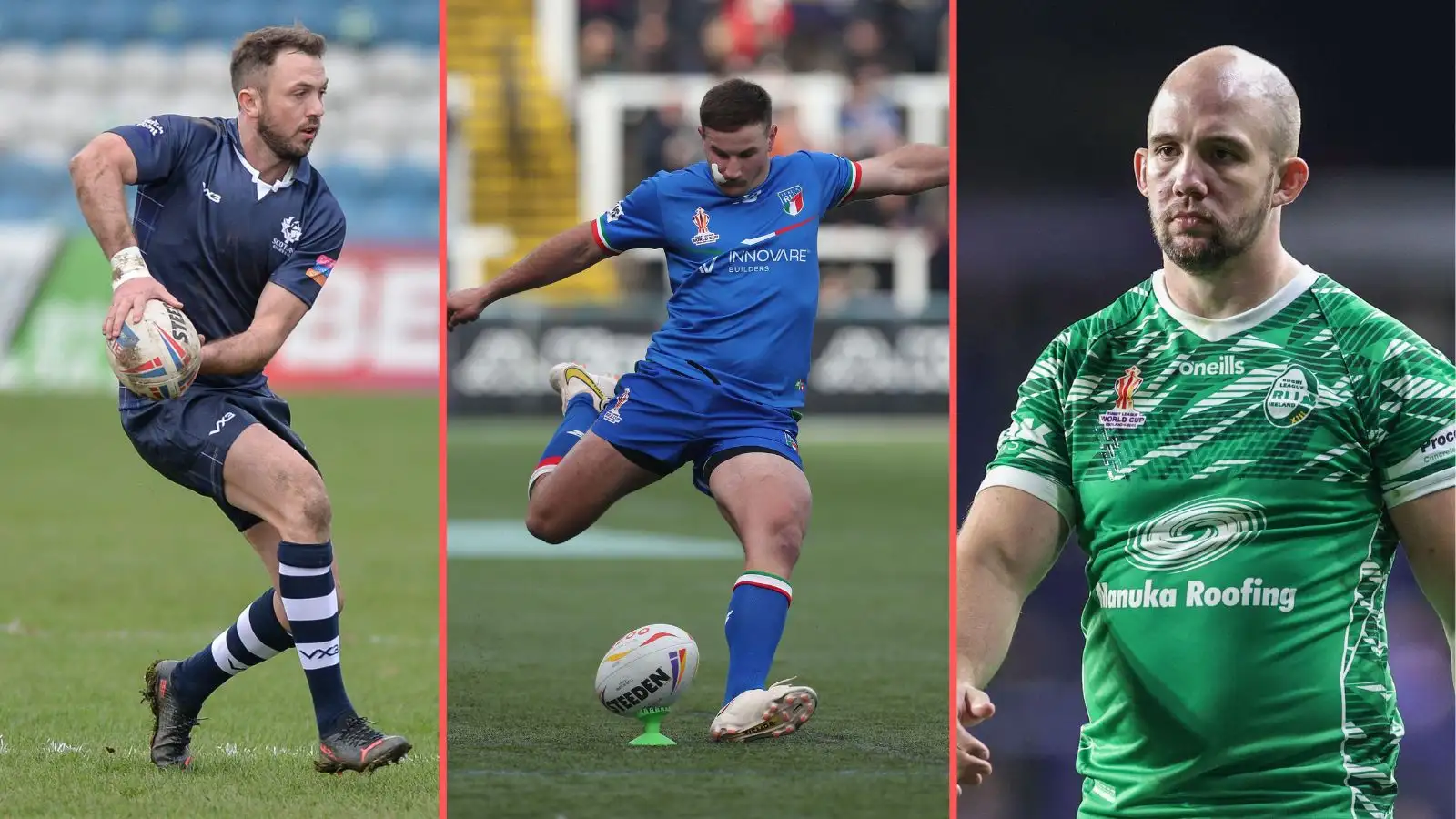Ireland & Scotland denied 2026 World Cup qualification shot as quintet see membership status dropped

Super League stars Ryan Brierley (left, Scotland), Jack Campagnolo (middle, Italy) & George King (right, Ireland) will not be at the 2026 World Cup with their respective nations
Ireland and Scotland will not have a chance to play in the 2026 Rugby League World Cup after seeing their membership status dropped to ‘affiliate’ level, along with three other nations.
Italy and Russia have also been reclassified as ‘affiliate’ countries as well as Lebanon, with the International Rugby League board stating that the five nations’ governing bodies have been non-compliant with the terms of their membership policy for up to five years.
Crucially, because Lebanon had already automatically qualified for the 2026 World Cup as one of the eight quarter-finalists from the 2021 edition of the tournament, their spot in the next edition will not be affected.
The Cedars will still compete in the World Cup in 2026, which will be staged in the Southern Hemisphere with host nation(s) still to be confirmed.
Due to the ongoing war with Ukraine, Russia had already been suspended from competing internationally, as has happened in numerous other sports.
But for Ireland, Scotland and Italy, any hopes of qualifying for the World Cup have been brought to an end without a ball being kicked – or thrown, as confirmed on the International Rugby League website.
READ NEXT: Super League players who have boosted England chances including Hull KR duo, Leeds Rhinos, St Helens
Ireland & Scotland denied 2026 World Cup qualification shot as quintet see membership status dropped

With Russia excluded, the other four nations’ governing bodies will all receive ‘parachute payments’ to be able to invest in the areas where they are currently deemed non-compliant.
It is up to each country’s board to re-apply for full membership status, and only then will they be able to compete in qualifying for future tournaments.
In their press release confirming the lowering of the nations’ membership statuses, International Rugby League say that details of the qualifying tournaments for the men’s World Cup in 2026 will be locked in next month when chiefs meet in Singapore.
Australia, Samoa, New Zealand, England, the aforementioned Lebanon, Tonga, Fiji and Papua New Guinea are the eight nations who already know they’ll definitely be involved in two years’ time
As we understand it, a ‘World Series’ tournament in 2025 will determine how those last two spots will be filled. The Cook Islands – as the sole eligible Asia-Pacific nation – and the winners of the Americas, European and Middle East-Africa (MEA) qualifying tournaments will all face off, with the top two from those four claiming a place at the 2026 World Cup.
Wolfhounds working hard to regain full membership status
Rugby League Ireland Chairman Jim Reynolds gave a short statement in the IRL’s press release, saying: “RLI thanks both IRL and ERL for recognising the significant transformation we have achieved since COVID in addressing the non-compliance issues that have been raised with RLI for the last ten years.
“We have worked hard to exceed the standards in good governance and with our youth groups becoming one year older, they will now also qualify to allow us regain full IRL membership status this year end.”
Elsewhere, Spain and Argentina have been granted ‘observer member’ status by the IRL board, while six nations have actually been expelled altogether following a few years of inactivity.
Those six are Belgium, Denmark, Ethiopia, Latvia, Saudi Arabia and Trinidad & Tobago.

Five other nations apply for full membership as they look to be involved in 2026 Rugby League World Cup
While five nations are no longer able to qualify for the next World Cup, IRL Secretary General Danny Kazandjian revealed that there are five others who have submitted applications and look likely to replace them.
It’s unknown as yet who those five nations are, and indeed where they come from in the world, but if authorised in time we could see them take part in the qualification process come 2025.
Kazandjian said: “IRL currently has five good quality full member applications under evaluation and there are likely to be at least another two later this year.
“We work continuously with member federations to improve their operations and governance, and we are seeing standards increase on and off the field.
“Over a long arc, ensuring compliance with IRL’s regulatory framework will result in a bigger, more durable, more prolific sport.
“In many of our members, the most reliable sign of growth is producing more registered rugby league players who play in organised 13-a-side championships, usually for rugby league clubs that are themselves members of their own national federation.
“Our focus is most certainly on that critical local growth.”



